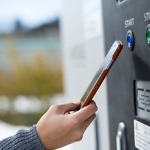Frictionless Parking: The Key to a Stress-Free Commute

Are you tired of circling a parking lot, searching for an available spot?
Have you ever missed an important meeting or appointment because you couldn’t find a parking space on time?
Parking has always been a hassle for commuters, but with the advancement of technology, there are now innovative solutions that can make parking a stress-free experience. In this article, we’ll discuss frictionless parking improvements and how they can transform how we park our vehicles.
The traditional parking process involves driving around a parking lot, looking for an available spot, and then struggling to park the vehicle. It’s a time-consuming and stressful experience that can leave drivers frustrated and anxious. Fortunately, with the advent of technology, there are now solutions that can streamline the parking process and make it more convenient for everyone.
Frictionless parking improvements are designed to make parking as seamless as possible. They leverage advanced technologies like IoT, AI, and machine learning to create a more efficient parking experience. This article will explore some of the most innovative frictionless parking solutions and how they can benefit drivers, parking operators, and cities.
The Benefits of Frictionless Parking
Frictionless parking can offer numerous benefits to drivers, parking operators, and cities. Let’s take a closer look at some of the advantages of frictionless parking:
- Time-saving: With frictionless parking, drivers can find available spots quickly and easily. This saves time and reduces stress, making the parking experience more pleasant.
- Cost-effective: Frictionless parking can help operators optimize their operations and reduce costs. Automating the parking process can eliminate the need for personnel and reduce overhead expenses.
- Improved safety: Frictionless parking can reduce the risk of accidents and collisions. With advanced sensors and cameras, parking operators can monitor parking areas and detect potential hazards.
- Environmental-friendly: Frictionless parking can reduce the environmental impact of driving. By minimizing the time spent circling around the parking lot, it can help reduce traffic congestion and air pollution.
Innovative Frictionless Parking Solutions
Now that we know the benefits of frictionless parking let’s take a look at some of the most innovative solutions available:
- Smart Parking Meters: Smart parking meters are equipped with sensors that detect when a parking spot is vacant. They transmit this information to a central server, displaying the available spots on a mobile app or website. This helps drivers find parking spots quickly and easily, reducing the time spent searching for an available spot.
- License Plate Recognition (LPR) Systems: LPR systems use cameras to scan license plates and match them with a database of registered vehicles. This allows parking operators to monitor who enters and exits the parking area, reducing the risk of unauthorized parking and improving security.
- Automated Parking Systems: Automated parking systems use robots to park and retrieve vehicles. These systems can reduce the need for parking attendants and make parking more efficient.
- Valet Parking Apps: Valet parking apps allow drivers to request a valet service through their smartphone. The app uses GPS to locate the driver and send a valet to park the car. This can save time and eliminate the need for the driver to park the vehicle.
The Future of Frictionless Parking
The future of frictionless parking is bright. As technology evolves, we can expect to see even more innovative solutions that make parking a seamless and stress-free experience. Some of the future developments in frictionless parking may include:
- Predictive Parking: Predictive parking uses data analytics and machine learning to predict parking availability in real-time. This means that drivers can be directed to available parking spots before arriving at their destination.
- Connected Vehicles: Connected vehicles can communicate with the parking infrastructure to identify available parking spots and reserve them in advance. This can save time and reduce the stress of finding parking.
- Autonomous Vehicles: With autonomous vehicles, the need for human intervention in the parking process can be eliminated entirely. Self-driving cars can park themselves and retrieve themselves when needed, freeing up time for drivers and reducing the need for parking spaces.
Frictionless parking is the key to a stress-free commute. With technological advancements, parking can now be a seamless and efficient experience. From smart parking meters to valet parking apps, there are a variety of innovative solutions available that can benefit drivers, parking operators, and cities. And as technology continues to evolve, we can expect to see even more exciting developments.
So the next time you head out for a drive, remember that frictionless parking is just a click away!
[pluginops_popup_form template_id=’7372′ onscroll=’20’ entranceanimation=’bounce’ exitanimation=’fadeOut’]


